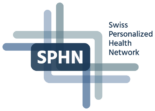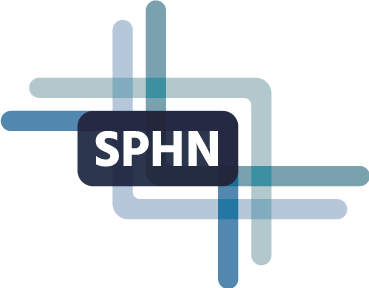Personalized Swiss Sepsis Study: Detection and modelling of sepsis using machine learning to analyse continuous ICU monitoring, laboratory, microbiology, and -omics data for personalized sepsis management (PSSS).
Project consortium: Prof. Adrian Egli (USB/UniBS), Prof. Reto Schüpbach (USZ), Prof. Thierry Calandra (CHUV), Prof. Martin Siegemund (USB), Prof. Karsten Borgwardt (PI PHRT part, ETHZ), Prof. Stephan Marsch (USB), Prof. Stephan Jakob (Inselspital), Prof. Jérôme Pugin (HUG), Prof. Philippe Eckert (CHUV), Prof. Manuel Battegay (USB), Prof. Annelies Zinkernagel (USZ), Prof. Laurent Kaiser (HUG), Prof. Rainer Weber (USZ), Prof. Hans-Jakob Furrer (Inselspital), Prof. Christoph Dehio (UniBas), Prof. Nicola Zamboni (ETHZ), Prof. Peter Bühlmann (ETHZ), Prof. Nicola Meinshausen (ETHZ), Prof. Gunnar Rätsch (ETHZ), Prof. Gilbert Greub (CHUV), Prof. Jacques Schrenzel (HUG), Prof. Peter Keller (UZH), Prof. Stephen Leib (UniBE).
Main achievements
Achievement 1: We have generated an ethical, legal, and governance framework
- All five Swiss ethical committees approved the two studies for (i) digital biomarker study: Article 34, and (ii) -omics biomarker study: individual consent based.
- Legal documents were developed and signed for: (i) consortium agreement with scientific and executive board; (ii) data transfer and use agreement (DTUA); (iii) publication policy.
- A governance structure was established (regular meetings of different boards).
- The re-use of the framework documents was enabled for other data projects across Switzerland e.g., the Swiss Pathogen Surveillance Platform (spsp.ch).
- The CA had to be re-signed by end of December 2021 to access all collected data to this point – this has been achieved in November 2022.
Achievement 2: We could recruit 18'000 Intensive Care Unit (ICU) patients for an unprecedented Swiss ICU dataset.
Since November 2019 around 18’000 patients were included providing millions of measurements for many variables. Data collection at each clinical data warehouse continues. The collected data is high-resolution with time-series and is an unprecedented dataset focusing on severe infectious diseases on ICUs – it also covers all ICU related data from SARS-CoV-2 data and from non-infection controls on the ICU, which offers multiple research possibilities across all Swiss centers.
Achievement 3: We focused our data collection on sepsis-related data, which is an important and unique type of data.
We released these data regularly with a shared concept for all centers e.g., “Infection” tag and established new data concepts for e.g., antibiotic drugs resistance, mechanical ventilation, organ support, microbiology, body position, etc. Regular data transfer via BioMedIT to Leonhard Med with Resource Description Format (RDF) and state-of-the-art de-identification (pseudonymization and time shift) and encryption was performed.
Reusable infrastructure and datasets
Standardized dataset on «Personalized Swiss Sepsis Study»
Based on the requirement analysis and all specifications, we harmonized within the SPHN framework, a large part of complex clinical and laboratory data variables relevant for infections, such as Sepsis 3.0 definition criteria, continuous ICU monitoring, laboratory values, bacterial species identification, antibiotic resistance, and many more. We included a list of 500 variables and associated attributes. Variables were defined by our Data Management and Integration team, submitted to, and then discussed with the Semantic working group of SPHN. The Data Management and Integration team was assembled from at least one expert of each institutional clinical data warehouse. The teams regularly met and discussed the requested requirements and specification for our project.
These data were collected from primary systems (e.g., ICU monitor, patient data management system or laboratory information system) and stored in local clinical data warehouses at each university hospital (Basel, Bern, Geneva, Lausanne, and Zurich). The data was transformed into RDF and transferred via the BioMedIT network to Leonhard Med hosted at ETH Zurich. The data scientists from ETH (including the data manager at the ETH side, Dr. Juliane Klatt), together with intensive care physicians, as well as clinical microbiologists conducted regular data quality rounds to identify error and improve the data quality. This interaction between experts allowed to provide detailed feedback regarding the data quality (interoperability and reproducibility) back to the SPHN IT infrastructure and thereby induce a stepwise and circular improvement of overall data quality during the project.
Available resources
The «infrastructure» is part of Leonhard Med. This can be accessed by contacting the executive committee of the governance board of the PSSS Driver project.
The current PIs from SPHN/PHRT may be contacted:
- Adrian Egli (University of Zurich): aegli@imm.uzh.ch
- Karsten Borgwardt (Max Planck Institute for Biochemistry, Munich as of 1 February 2023): borgwardt@biochem.mpg.de
Data dictionnaries
The data description has been coordinated with the semantic working group of SPHN. The ontologies established and used were LOINC and SNOMED CT. We followed the RDF data format for the transfer of the data from the CDWHs to Leonhard Med.
A total of 500+ variables were included, related to intensive care medicine, infectious diseases, and clinical microbiology.
Follow up projects – continuation – next steps
We have successfully applied for the National Data Stream (NDS) project entitled 'Personalized, data-driven prediction and assessment of infection-related outcomes in Swiss ICUs' (IICU).
Infections show a range of diverse phenotypes with variable impact on clinical course and outcomes. Our NDS proposal focuses on this heterogeneity within critically ill patients with severe infections using a combined clinical- and data-driven approach for an improved personalized assessment, characterization, and outcome prediction on patients with infections. We will integrate rich and diverse data sources to predict outcomes relevant in the lighthouse project and nested projects.
Infections show a range of diverse phenotypes with variable impact on clinical course and outcomes. Our NDS proposal focuses on this heterogeneity within critically ill patients with severe infections using a combined clinical- and data-driven approach for an improved personalized assessment, characterization, and outcome prediction on patients with infections. We will integrate rich and diverse data sources to predict outcomes relevant in the lighthouse project and nested projects.
More information on the NDS IICU can be found here.
Links and references relevant to the project
PSSS Website: www.sepsis-network.ch
Watch the SPHN Webinar
References on Pubmed
- Moor M, Horn M, Rieck B, Roqueiro D, Borgwardt K. Early Recognition of Sepsis with Gaussian Process Temporal Convolutional Networks and Dynamic Time Warping. Machine Learning for Healthcare Conference (MLHC) 2019 and Proceedings of Machine Learning Research 106:2–26, 2019
- Egli A, Battegay M, Büchler AC, Bühlmann P, Calandra T, Eckert P, Furrer H, Greub G, Jakob SM, Kaiser L, Leib SL, Marsch S, Meinshausen N, Pagani JL, Pugin J, Rätsch G, Schrenzel J, Schüpbach R, Siegemund M, Zamboni N, Zbinden R, Zinkernagel A, Borgwardt K. SPHN/PHRT: Forming a Swiss-Wide Infrastructure for Data-Driven Sepsis Research. Stud Health Technol Inform. 2020 Jun 16;270:1163-1167. doi: 10.3233/SHTI200346.
- Gumbsch T, Bock C, Moor M, Rieck B, Borgwardt K. Enhancing statistical power in temporal biomarker discovery through representative shapelet mining. 2020 Dec 30;36(Suppl_2):i840-i848. doi: 10.1093/bioinformatics/btaa815.
- Moor M, Rieck B, Horn M, Jutzeler CR, Borgwardt K. Early Prediction of Sepsis in the ICU Using Machine Learning: A Systematic Review. Front Med (Lausanne). 2021 May 28;8:607952. doi: 10.3389/fmed.2021.607952. eCollection 2021.
Disclaimer: The contents on this website are intended as a general source of information and have been provided by the project PIs. The SPHN Management Office is not responsible for its accuracy, validity, or completeness.

